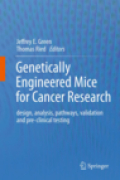
Genetically engineered mice for cancer research: design, analysis, pathways, validation and pre-clinical testing
Green, Jeffrey E.
Ried, Thomas
Genetically-engineered mouse models for cancer research have become invaluable tools for studying cancer biology and evaluating novel therapeutic approaches. This volume focuses on state-of-the-art methods for generating, analyzing and validating such models for studying aspects of human cancer biology. Additionally, these models are emerging as important pre-clinical systems in which to test cancer prevention and therapeutic strategies in order to select compounds for testing in clinical trials. INDICE: Foreword. Preface. Overview of Designing Genetically-Engineered Mouse Models. The Use of Cre-loxP Technology and Inducible Systems to Generate Mouse Models of Cancer. Using Recombineering Technology To Create Genetically Engineered Mouse Models. Insertional Mutagenesis for Generating Mouse Models ofCancer. The RCAS/TVA Somatic Gene Transfer Method In Modeling Human Cancer. Target-selected ENU Mutagenesis to Develop Cancer Models in the Rat. The Tumor Pathology of Genetically Engineered Mice: Genomic Pathology. Genomic DNA Copy Number Alterations in Mouse Cancer Models and Human Cancer. Characterization of chromosomal translocations in mouse models of hematological malignancies using spectral karyotyping (SKY), FISH, and immunocytochemistry. Expression Profiling of Mouse Models of Human Cancer: model categorization and guidance for preclinical testing. Imaging mouse models of human cancer. Identifying Mammary Epithelial Stem and Progenitor Cells. Differentiation Programs in Development and Cancer. Roles of p53 and PRB Tumor Suppressor Networks in Human Cancer: Insight from Studies in the Engineered Mouse. Mouse Models for Colorectal Cancer.Src family tyrosine kinases: Implications for mammary tumor progression. Maspin and Suppression of Tumor Metastasis. Epigenetic Mouse Models. Modeling Transforming Growth Factor-ß Signaling in Cancer. Modeling Stromal-Epithelial Interactions.- Utilizing Mouse Models of Human Cancer for Assessing Immune-Modulation of Cancer Development.- Transplanted Tumor Models For Preclinical Drug Testing And The Potential Benefit Of Genetically Engineered Mouse Models. The Development and Use of Genetically Tractable Pre-Clinical Mouse Models. Animal Models for Breast Cancer Prevention Resarch. Oncogene Addiction: Mouse Models and Clinical Relevance for Molecularly Targeted Therapies. Mouse Models in Preclinical Drug Development- Applications to CNS Models. Mouse Models of Human Cancer: Role in Pre-clinical Testing and Personalized Medicine. Mighty, But HowUseful? The Emerging Role of Genetically Engineered Mice in Cancer Drug Discovery and Development. Index. .
- ISBN: 978-0-387-69803-8
- Editorial: Springer New York
- Encuadernacion: Cartoné
- Páginas: 632
- Fecha Publicación: 31/01/2012
- Nº Volúmenes: 1
- Idioma: Inglés
